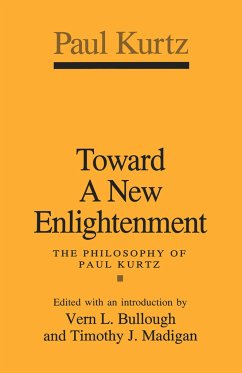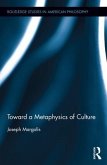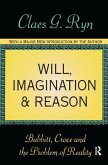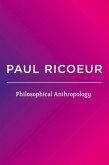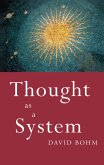Toward a New Enlightenment
Philosophy of Paul Kurtz
Herausgeber: Kurtz, Paul
Toward a New Enlightenment
Philosophy of Paul Kurtz
Herausgeber: Kurtz, Paul
- Gebundenes Buch
- Merkliste
- Auf die Merkliste
- Bewerten Bewerten
- Teilen
- Produkt teilen
- Produkterinnerung
- Produkterinnerung
Paul Kurtz has been the dominant voice of secular humanism over the past thirty years
Andere Kunden interessierten sich auch für
![Toward a Metaphysics of Culture Toward a Metaphysics of Culture]() Joseph MargolisToward a Metaphysics of Culture189,99 €
Joseph MargolisToward a Metaphysics of Culture189,99 €![Will, Imagination, and Reason Will, Imagination, and Reason]() Claes G RynWill, Imagination, and Reason190,99 €
Claes G RynWill, Imagination, and Reason190,99 €![Philosophical Anthropology Philosophical Anthropology]() Paul RicoeurPhilosophical Anthropology70,99 €
Paul RicoeurPhilosophical Anthropology70,99 €![The Roots of Praxiology The Roots of Praxiology]() Victor AlexandreThe Roots of Praxiology188,99 €
Victor AlexandreThe Roots of Praxiology188,99 €![Thought as a System Thought as a System]() David BohmThought as a System187,99 €
David BohmThought as a System187,99 €![Leibniz and the Environment Leibniz and the Environment]() Pauline PhemisterLeibniz and the Environment209,99 €
Pauline PhemisterLeibniz and the Environment209,99 €![Collective Imaginings Collective Imaginings]() Moira GatensCollective Imaginings187,99 €
Moira GatensCollective Imaginings187,99 €-
-
-
Paul Kurtz has been the dominant voice of secular humanism over the past thirty years
Hinweis: Dieser Artikel kann nur an eine deutsche Lieferadresse ausgeliefert werden.
Hinweis: Dieser Artikel kann nur an eine deutsche Lieferadresse ausgeliefert werden.
Produktdetails
- Produktdetails
- Verlag: Taylor & Francis
- Seitenzahl: 416
- Erscheinungstermin: 30. Januar 1991
- Englisch
- Abmessung: 236mm x 158mm x 28mm
- Gewicht: 730g
- ISBN-13: 9781560001188
- ISBN-10: 1560001186
- Artikelnr.: 26192874
- Herstellerkennzeichnung
- Libri GmbH
- Europaallee 1
- 36244 Bad Hersfeld
- gpsr@libri.de
- Verlag: Taylor & Francis
- Seitenzahl: 416
- Erscheinungstermin: 30. Januar 1991
- Englisch
- Abmessung: 236mm x 158mm x 28mm
- Gewicht: 730g
- ISBN-13: 9781560001188
- ISBN-10: 1560001186
- Artikelnr.: 26192874
- Herstellerkennzeichnung
- Libri GmbH
- Europaallee 1
- 36244 Bad Hersfeld
- gpsr@libri.de
Paul Kurtz
Introduction: Toward a New Enlightenment
One: Ethics and the Planetary Society
Introduction to Part One
1: Humanist Ethics: Eating the Forbidden Fruit
2: The Relevance of Science to Ethics
3: The Twenty-First Century and Beyond: The Need for a New Global Ethic and a Declaration of Interdependence
Two: Democratic Ideas, Pluralism
Introduction to Part Two
4: Humanism and the Freedom of the Individual
5: Democracy without Theology: Dialogue with Evangelists
6: Excellence and Irrelevance: Democracy and the Higher Learning
7: Misuses of Civil Disobedience
8: The Limits of Tolerance
9: Beyond Multiculturalism: Toward a Humanist Universalism
10: Will Secularism Survive?
Three: Skepticism: Science and Antiscience
Introduction to Part Three
11: The Scientific Attitude vs. Antiscience and Pseudoscience
12: Antireason
13: Science and the Paranormal: An Overview
14: Skepticism about the Paranormal: Legitimate and Illegitimate
Four: Atheism, Humanism, and Religion
Introduction to Part Four
15: Humanism and the Open Society: Dialogues with Marxists and Roman Catholics
16: Militant Atheism vs. Freedom of Conscience: Reflections on the Moscow Atheist/Humanist Dialogue
17: Humanism and Atheism: Exploring Similarities and Differences
18: The Church under Siege: Reflections on the Vatican/Humanist Dialogue
19: The Argument from Revelation Reexamined
20: Is Life Meaningful in a Universe without God?
21: Finding a Common Ground between Believers and Unbelievers
22: The Growth of Fundamentalism Worldwide: A Humanist Response
Five: Paul Kurtz in Person and in Action
Introduction to Part Five
23: In Defense of Eupraxophy
24: Promethean Love: Unbound
25: On Nearly Dying-Unceremoniously and Unexpectedly
26: The Case for Euthanasia: A Humanistic Perspective
Six: On the Barricades
Introduction to Part Six
27: Does Faith Healing Work?
28: Faith Healing: Miracle or Hoax?
29: The New Inquisition in the Schools
30: Bigfoot on the Loose
or, How to Create a Legend
31: A Case Study of the West Pittston "Haunted" House
32: Near-Death Experiences: A Skeptical View
One: Ethics and the Planetary Society
Introduction to Part One
1: Humanist Ethics: Eating the Forbidden Fruit
2: The Relevance of Science to Ethics
3: The Twenty-First Century and Beyond: The Need for a New Global Ethic and a Declaration of Interdependence
Two: Democratic Ideas, Pluralism
Introduction to Part Two
4: Humanism and the Freedom of the Individual
5: Democracy without Theology: Dialogue with Evangelists
6: Excellence and Irrelevance: Democracy and the Higher Learning
7: Misuses of Civil Disobedience
8: The Limits of Tolerance
9: Beyond Multiculturalism: Toward a Humanist Universalism
10: Will Secularism Survive?
Three: Skepticism: Science and Antiscience
Introduction to Part Three
11: The Scientific Attitude vs. Antiscience and Pseudoscience
12: Antireason
13: Science and the Paranormal: An Overview
14: Skepticism about the Paranormal: Legitimate and Illegitimate
Four: Atheism, Humanism, and Religion
Introduction to Part Four
15: Humanism and the Open Society: Dialogues with Marxists and Roman Catholics
16: Militant Atheism vs. Freedom of Conscience: Reflections on the Moscow Atheist/Humanist Dialogue
17: Humanism and Atheism: Exploring Similarities and Differences
18: The Church under Siege: Reflections on the Vatican/Humanist Dialogue
19: The Argument from Revelation Reexamined
20: Is Life Meaningful in a Universe without God?
21: Finding a Common Ground between Believers and Unbelievers
22: The Growth of Fundamentalism Worldwide: A Humanist Response
Five: Paul Kurtz in Person and in Action
Introduction to Part Five
23: In Defense of Eupraxophy
24: Promethean Love: Unbound
25: On Nearly Dying-Unceremoniously and Unexpectedly
26: The Case for Euthanasia: A Humanistic Perspective
Six: On the Barricades
Introduction to Part Six
27: Does Faith Healing Work?
28: Faith Healing: Miracle or Hoax?
29: The New Inquisition in the Schools
30: Bigfoot on the Loose
or, How to Create a Legend
31: A Case Study of the West Pittston "Haunted" House
32: Near-Death Experiences: A Skeptical View
Introduction: Toward a New Enlightenment
One: Ethics and the Planetary Society
Introduction to Part One
1: Humanist Ethics: Eating the Forbidden Fruit
2: The Relevance of Science to Ethics
3: The Twenty-First Century and Beyond: The Need for a New Global Ethic and a Declaration of Interdependence
Two: Democratic Ideas, Pluralism
Introduction to Part Two
4: Humanism and the Freedom of the Individual
5: Democracy without Theology: Dialogue with Evangelists
6: Excellence and Irrelevance: Democracy and the Higher Learning
7: Misuses of Civil Disobedience
8: The Limits of Tolerance
9: Beyond Multiculturalism: Toward a Humanist Universalism
10: Will Secularism Survive?
Three: Skepticism: Science and Antiscience
Introduction to Part Three
11: The Scientific Attitude vs. Antiscience and Pseudoscience
12: Antireason
13: Science and the Paranormal: An Overview
14: Skepticism about the Paranormal: Legitimate and Illegitimate
Four: Atheism, Humanism, and Religion
Introduction to Part Four
15: Humanism and the Open Society: Dialogues with Marxists and Roman Catholics
16: Militant Atheism vs. Freedom of Conscience: Reflections on the Moscow Atheist/Humanist Dialogue
17: Humanism and Atheism: Exploring Similarities and Differences
18: The Church under Siege: Reflections on the Vatican/Humanist Dialogue
19: The Argument from Revelation Reexamined
20: Is Life Meaningful in a Universe without God?
21: Finding a Common Ground between Believers and Unbelievers
22: The Growth of Fundamentalism Worldwide: A Humanist Response
Five: Paul Kurtz in Person and in Action
Introduction to Part Five
23: In Defense of Eupraxophy
24: Promethean Love: Unbound
25: On Nearly Dying-Unceremoniously and Unexpectedly
26: The Case for Euthanasia: A Humanistic Perspective
Six: On the Barricades
Introduction to Part Six
27: Does Faith Healing Work?
28: Faith Healing: Miracle or Hoax?
29: The New Inquisition in the Schools
30: Bigfoot on the Loose
or, How to Create a Legend
31: A Case Study of the West Pittston "Haunted" House
32: Near-Death Experiences: A Skeptical View
One: Ethics and the Planetary Society
Introduction to Part One
1: Humanist Ethics: Eating the Forbidden Fruit
2: The Relevance of Science to Ethics
3: The Twenty-First Century and Beyond: The Need for a New Global Ethic and a Declaration of Interdependence
Two: Democratic Ideas, Pluralism
Introduction to Part Two
4: Humanism and the Freedom of the Individual
5: Democracy without Theology: Dialogue with Evangelists
6: Excellence and Irrelevance: Democracy and the Higher Learning
7: Misuses of Civil Disobedience
8: The Limits of Tolerance
9: Beyond Multiculturalism: Toward a Humanist Universalism
10: Will Secularism Survive?
Three: Skepticism: Science and Antiscience
Introduction to Part Three
11: The Scientific Attitude vs. Antiscience and Pseudoscience
12: Antireason
13: Science and the Paranormal: An Overview
14: Skepticism about the Paranormal: Legitimate and Illegitimate
Four: Atheism, Humanism, and Religion
Introduction to Part Four
15: Humanism and the Open Society: Dialogues with Marxists and Roman Catholics
16: Militant Atheism vs. Freedom of Conscience: Reflections on the Moscow Atheist/Humanist Dialogue
17: Humanism and Atheism: Exploring Similarities and Differences
18: The Church under Siege: Reflections on the Vatican/Humanist Dialogue
19: The Argument from Revelation Reexamined
20: Is Life Meaningful in a Universe without God?
21: Finding a Common Ground between Believers and Unbelievers
22: The Growth of Fundamentalism Worldwide: A Humanist Response
Five: Paul Kurtz in Person and in Action
Introduction to Part Five
23: In Defense of Eupraxophy
24: Promethean Love: Unbound
25: On Nearly Dying-Unceremoniously and Unexpectedly
26: The Case for Euthanasia: A Humanistic Perspective
Six: On the Barricades
Introduction to Part Six
27: Does Faith Healing Work?
28: Faith Healing: Miracle or Hoax?
29: The New Inquisition in the Schools
30: Bigfoot on the Loose
or, How to Create a Legend
31: A Case Study of the West Pittston "Haunted" House
32: Near-Death Experiences: A Skeptical View

